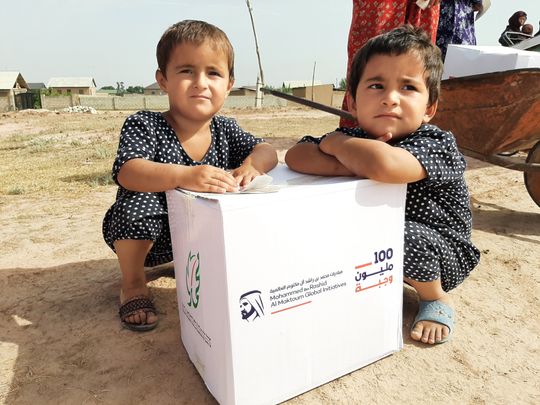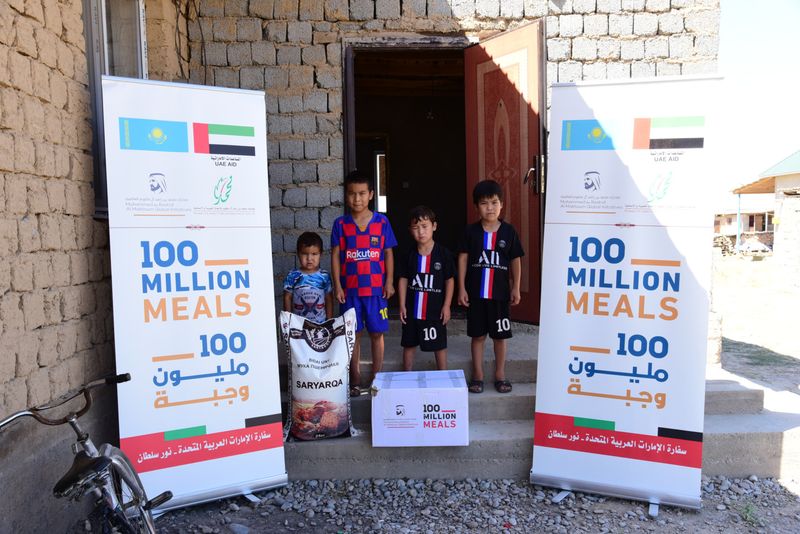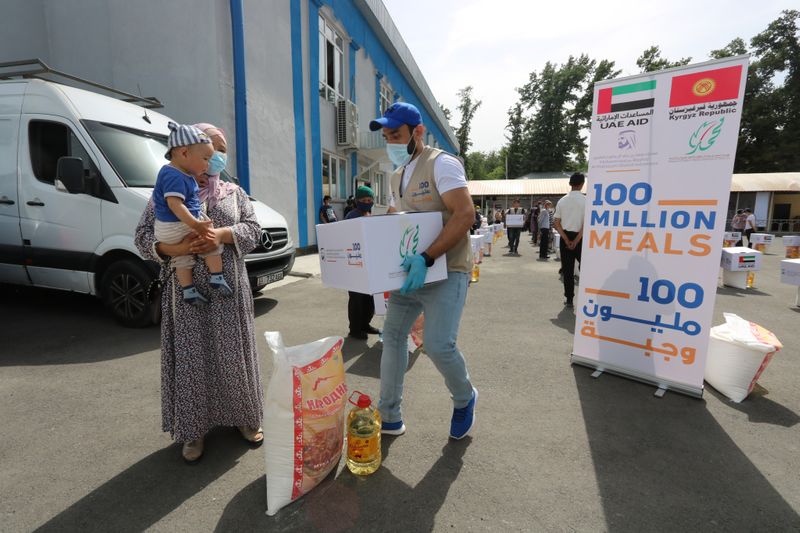The UAE 100 Million Meals campaign distributes 106 million meals in just four months

The 100 Million Meals campaign, which raised a total of Dh216 million after its launch during Ramadan this year, continues to provide food aid to those in need in 30 countries in the Middle East, Africa, Asia, Europe and the Americas. South.
Image credit: Introduction
Dubai: The United Arab Emirates, with its 100 million meals campaign, has distributed more than 106 million meals worldwide in the past four months, the Mohammed bin Rashid Al Maktoum Global Initiatives (MBRGI) announced on Tuesday.
The 100 Million Meals campaign, which raised a total of Dh216 million after its launch during Ramadan this year, continues to provide food aid to those in need in 30 countries in the Middle East, Africa, Asia, Europe and the Americas. South.
MBRGI noted that the next phase of the campaign, which uses blockchain technology and big data solutions to reach communities and people most in need, will distribute an additional 110 million meals.
Expanding humanitarian work
Sarah Al Nuaimi, Director of MBRGI, said: “The partnerships and smart technologies used throughout the 100 Million Meals campaign embody the vision of His Highness Sheikh Mohammed bin Rashid Al Maktoum, Vice President and Prime Minister of the UAE. Ruler of Dubai – to help develop innovative humanitarian tools. The campaign focused on expanding the humanitarian framework to form an integrated and open ecosystem that unites the efforts of various segments of society to support those in need wherever they are.”
“The 100 million meals campaign is an ideal model for the immediate response to the urgent humanitarian needs of the most vulnerable groups, reflecting the long tradition of humanitarian work in the UAE. He added that the campaign’s success in distributing the first 100 million meals in just four months highlights the importance of cooperation with regional and international organizations. And local charities in the beneficiary countries to reach the largest number of people.
food distribution
Food aid was distributed in the form of food baskets and instant coupons, allowing beneficiaries to purchase what they needed from partner stores. According to MBRGI, the campaign provided three million meals to Lebanon, 3.3 million to Sudan, 6.9 million to Ghana, 3 million to Uganda, and 3 million to Angola.

Food aid was distributed in the form of food baskets and instant coupons, allowing beneficiaries to purchase what they needed from partner stores.
Image credit: Introduction
In its next phase, the 100 Million Meals campaign will continue to distribute food aid in several countries, and Lebanon is expected to receive an additional 19.5 million meals; Sudan will receive an additional 5.7 million meals; Ghana 2.1 million meals; Uganda and Angola will each receive an additional 1.5 million meals.
International cooperation
MBRGI worked with the United Nations World Food Program (WFP), the Mohammed bin Rashid Al Maktoum Humanitarian and Charity Foundation (MBRCH) and the Regional Food Bank Network (FBRN) to implement the campaign in a fast and complete manner. Organizations participating in the campaign collaborated with local charities and humanitarian organizations in logistics and delivery of food parcels.
For his part, Ibrahim Mohammed Bu Melha, Advisor to the Governor of Dubai for Cultural and Humanitarian Affairs and Vice President of the Mohammed bin Rashid Al Maktoum Center, said that the contributions received in support of the campaign, from individuals to institutions, embody the culture of love for humanitarian and charitable work. and giving.
“The unique campaign has helped alleviate hunger and enhance people’s social well-being and economic performance of local markets and suppliers in the areas served during the pandemic,” said Moez Al-Shahdi, co-founder of FBRN.
Contribute in a timely manner
Majed Yahya, Director of the World Food Program in the UAE and representative of the Gulf Cooperation Council, said: “Coronavirus has paralyzed the global economy on several fronts, putting particularly vulnerable populations in acute food insecurity and entire communities on the brink of famine. MBRGI’s contribution helped In time during these challenging times, the World Food Program continues to support some 399,000 refugees and beneficiaries in Bangladesh, Jordan and Palestine, ensuring more than 39 million nutritious meals.

MBRGI worked closely with the United Nations World Food Programme, the Mohammed bin Rashid Al Maktoum Humanitarian and Charity Foundation, and the regional network of food banks to implement this comprehensive campaign.
Image credit: Introduction
take a look:
> The campaign has already provided 2.8 million meals to more than 67,000 beneficiaries in India, Pakistan, Kenya, Bangladesh, Ethiopia, Tanzania, Tajikistan, Kyrgyzstan, Kazakhstan, Brazil, Burundi, Senegal, Kosovo, Nepal, Benin and Uzbekistan.
> Campaign collaboration with FBRN has reached more than 806,000 beneficiaries in Lebanon, Egypt, Yemen, Sudan, Somalia, Jordan, Ghana, Uganda, Angola, Mauritania and Iraq with more than 61 million meals.
> In Egypt, more than 30 million meals were distributed, with food baskets containing essential items such as flour, rice, sugar and oil.
> In Palestine, the campaign distributed 28 million meals in the form of instant coupons in the Gaza Strip and in the regions, towns and villages of the West Bank.
> In cooperation with the World Food Program and in coordination with local authorities, more than 4.7 million meals have been provided to refugee camps in Jordan.
> More than 755,000 meals were distributed in Tanzania, Kenya and Senegal.
> In Central Asia, the 100 Million Meals campaign distributed 600,000 meals in Kazakhstan, Tajikistan and Kyrgyzstan.
> The campaign distributed 6.5 million meals to refugees in Bangladesh, 4.5 million meals in Mauritania, 145 thousand meals in Kosovo, 604 thousand meals in Ethiopia, 600,000 meals in Kazakhstan, Tajikistan and Kyrgyzstan, and 442,000 meals in Brazil.

“Award-winning zombie scholar. Music practitioner. Food expert. Troublemaker.”









